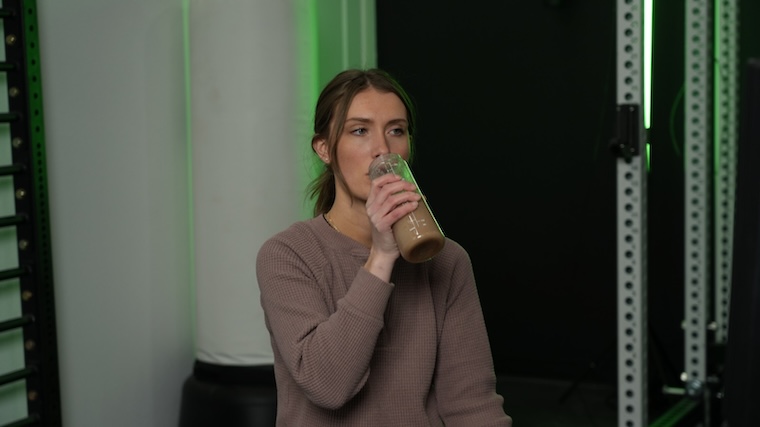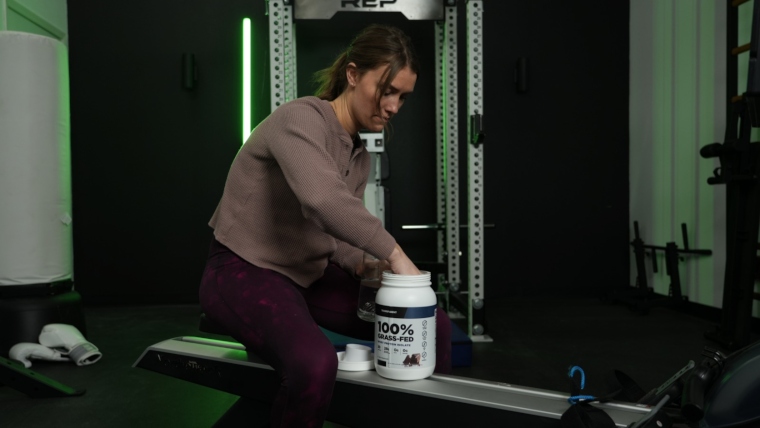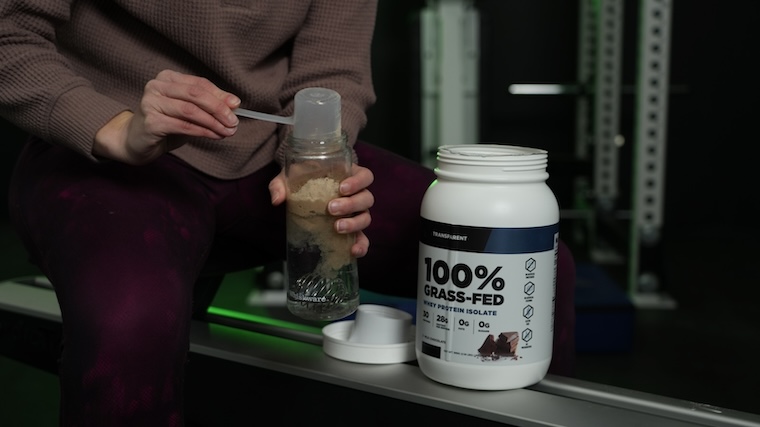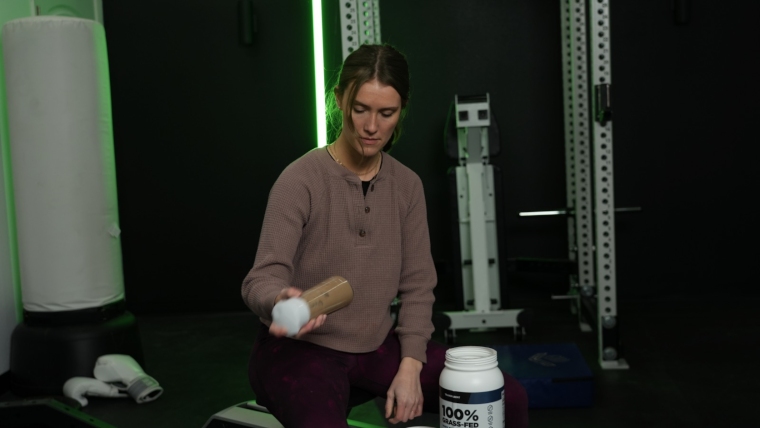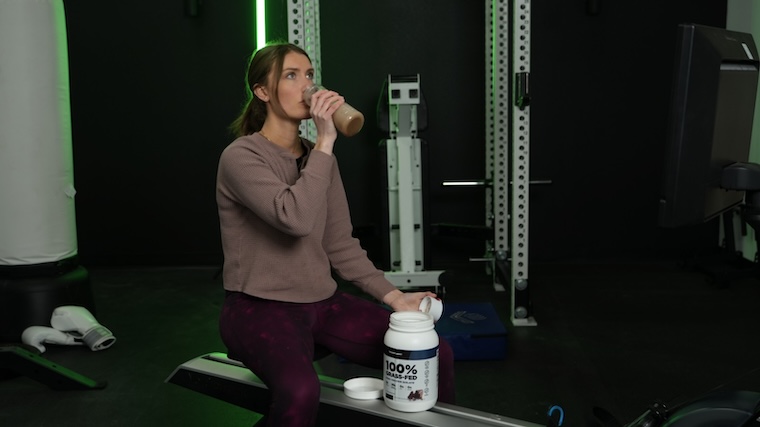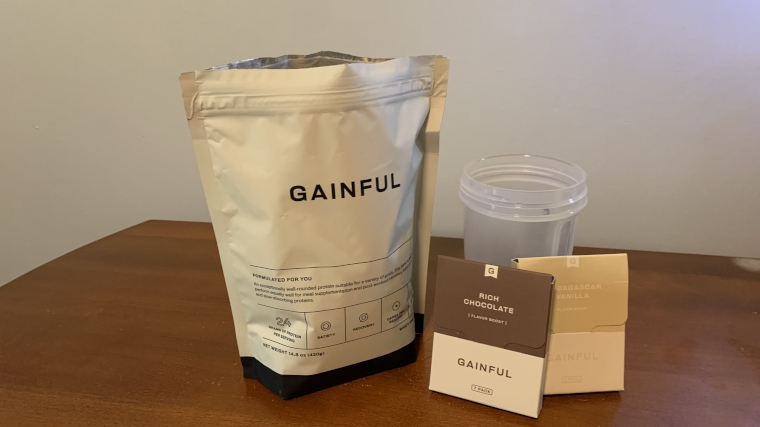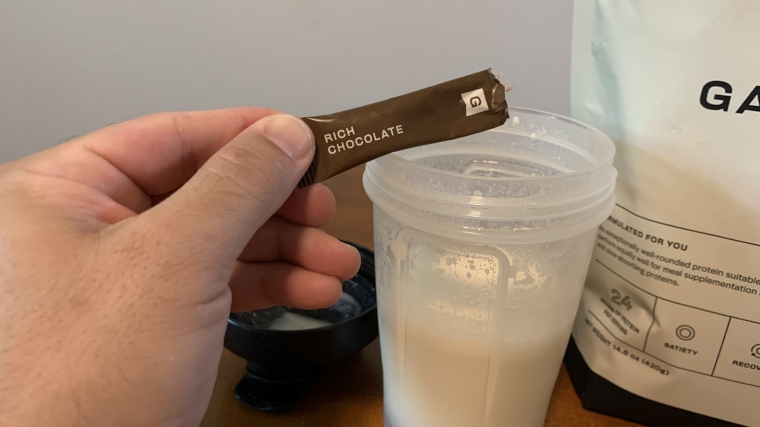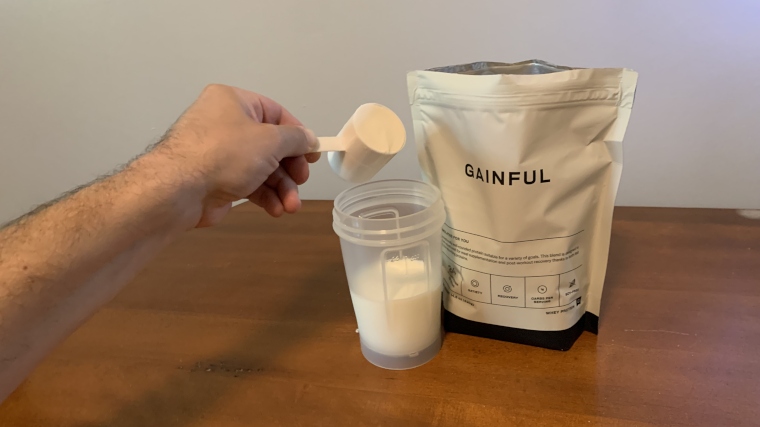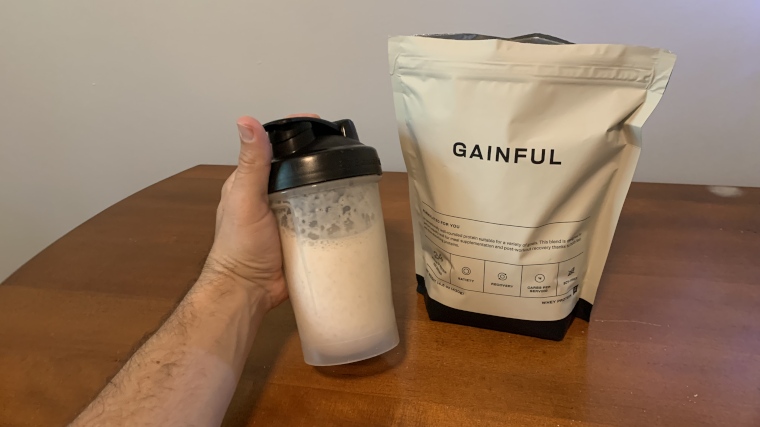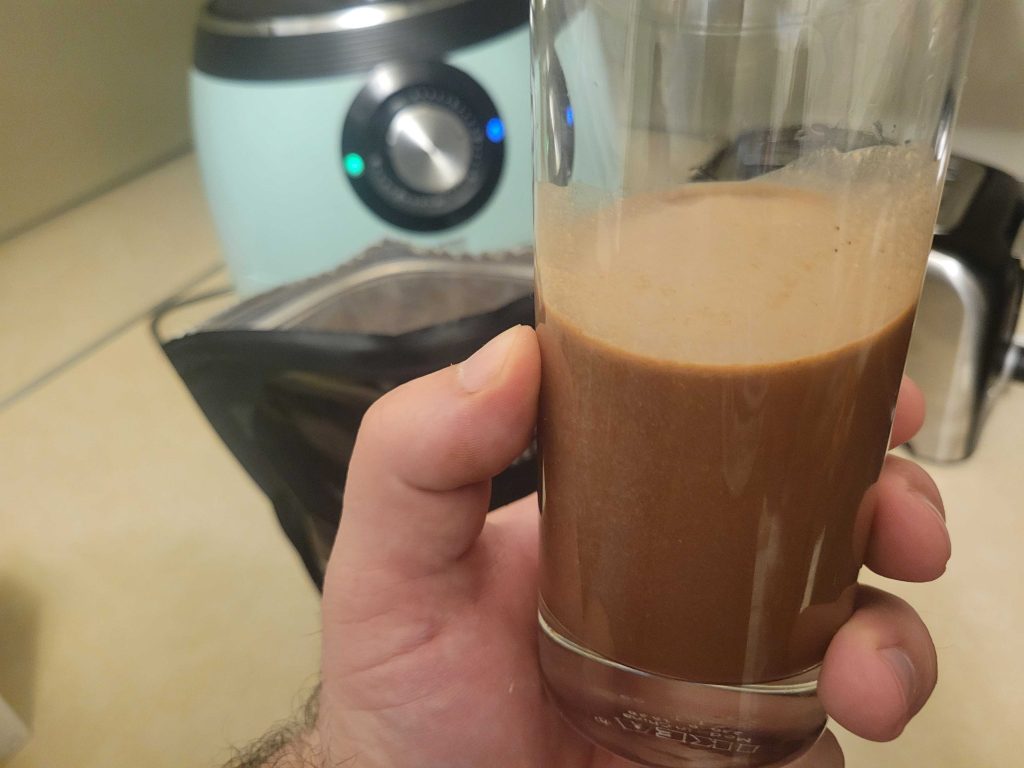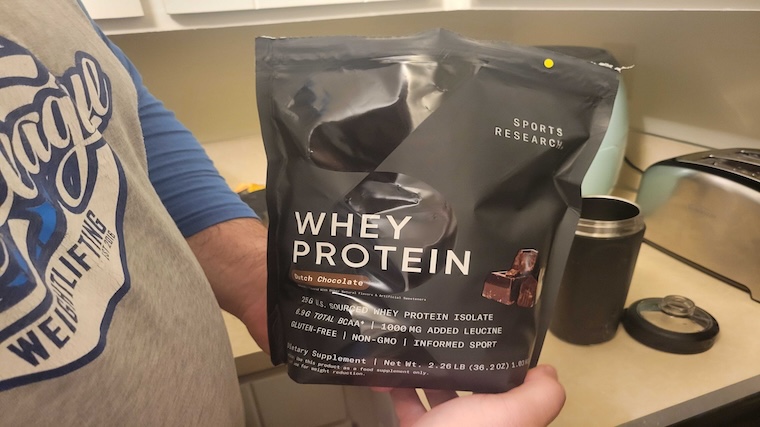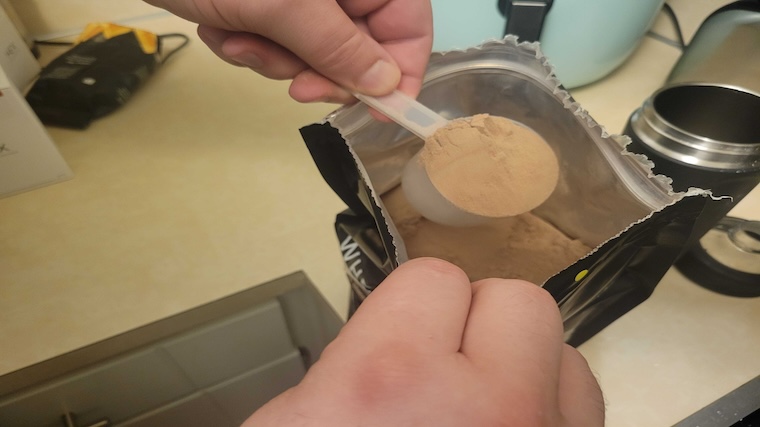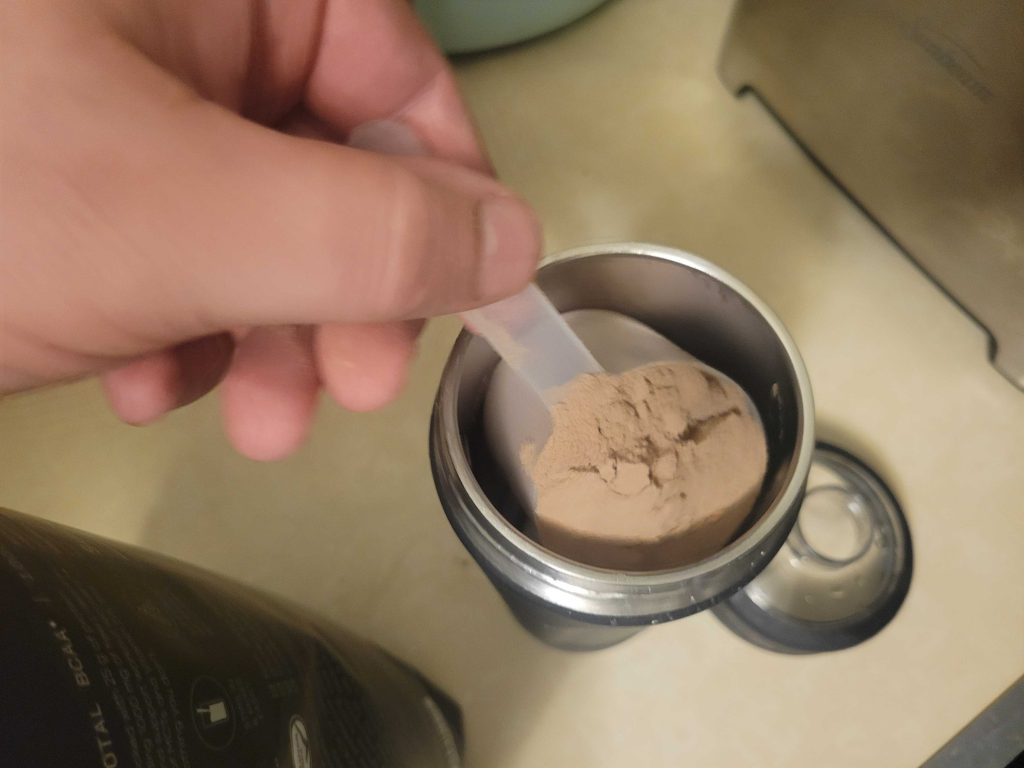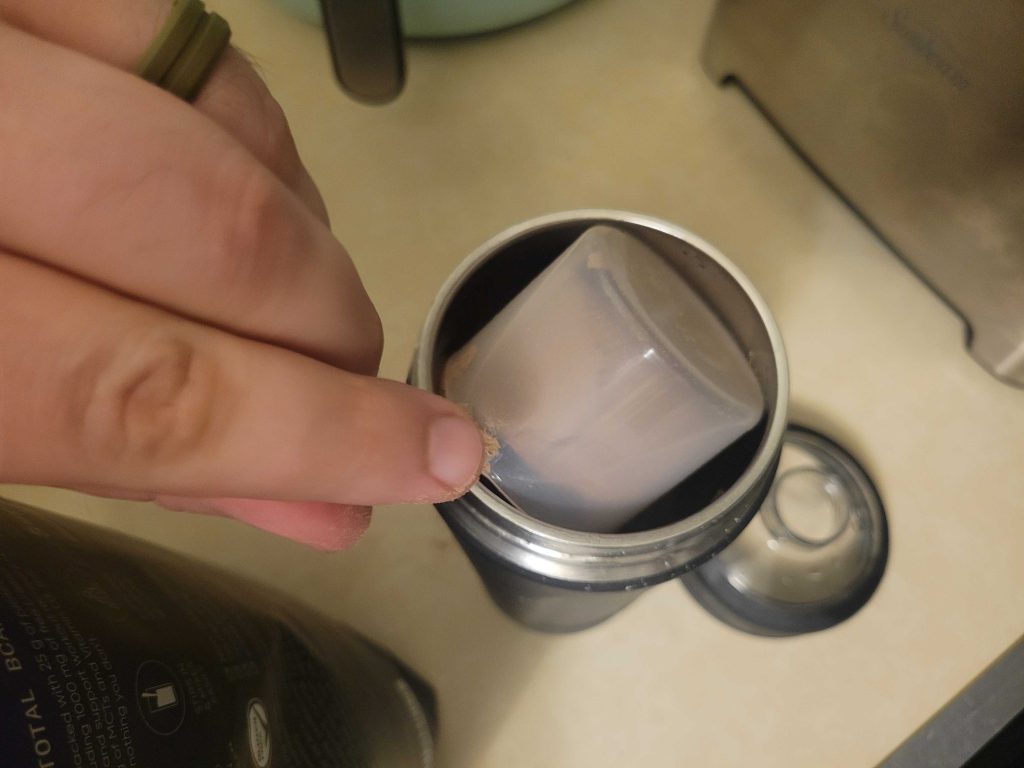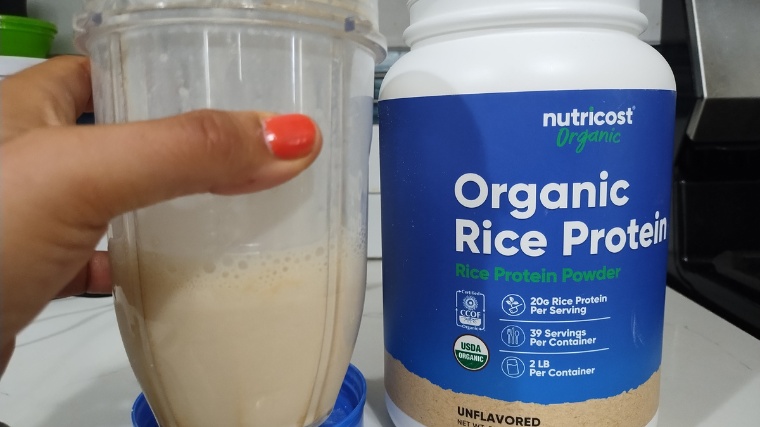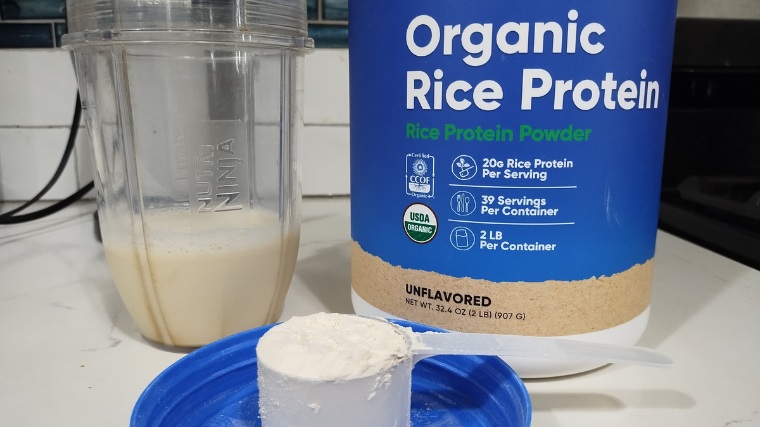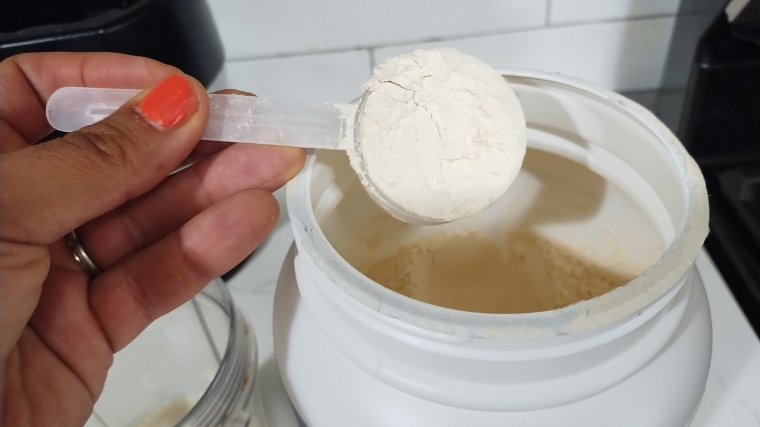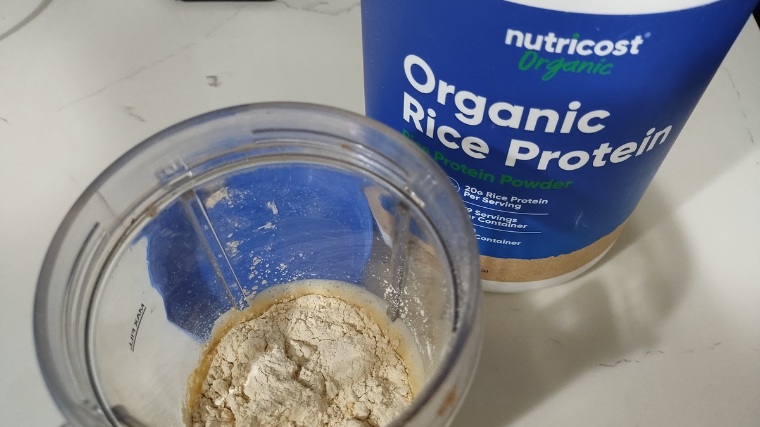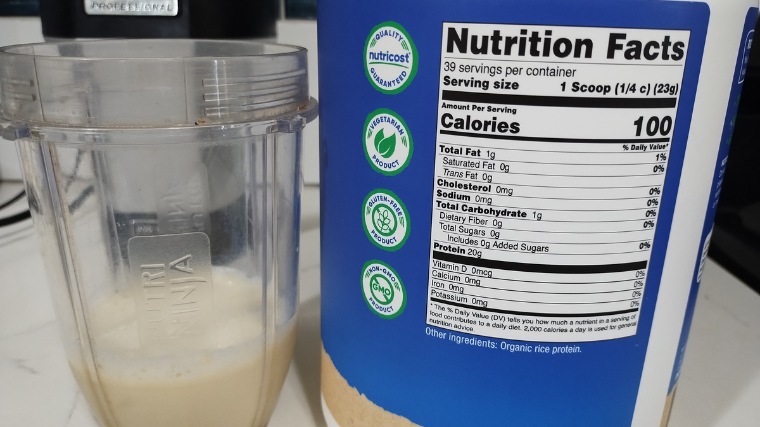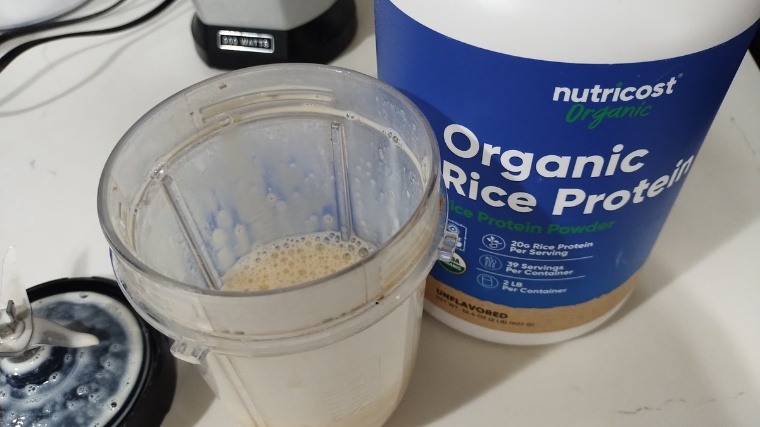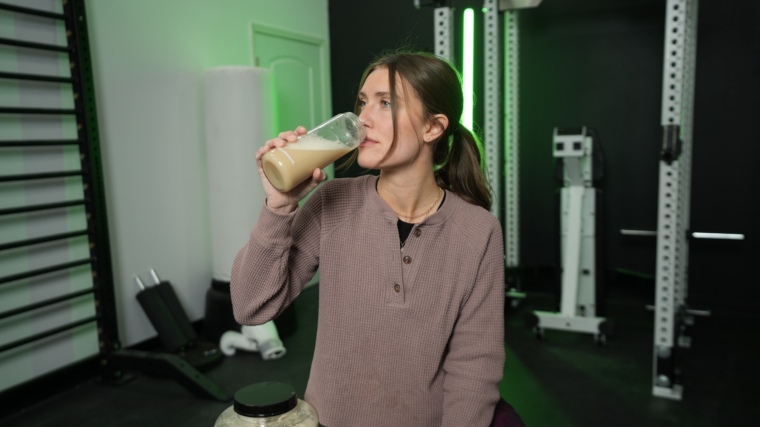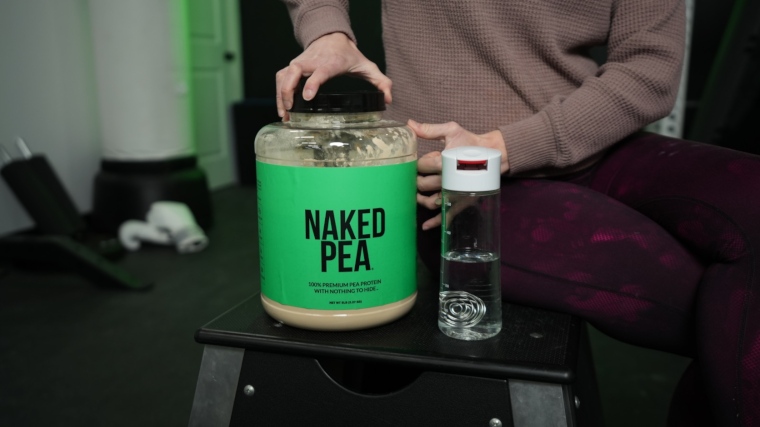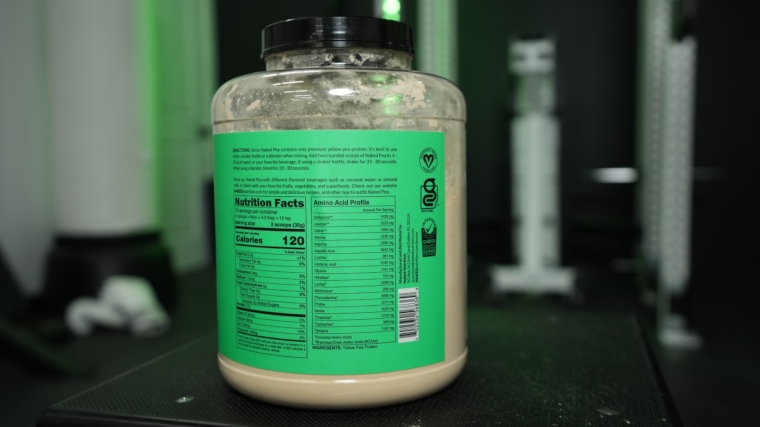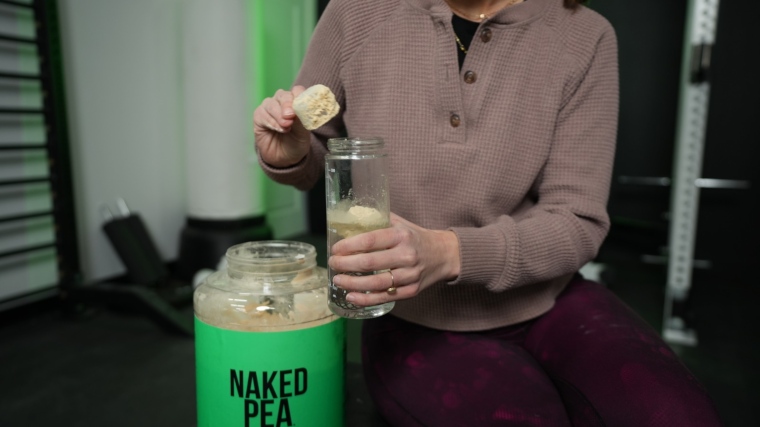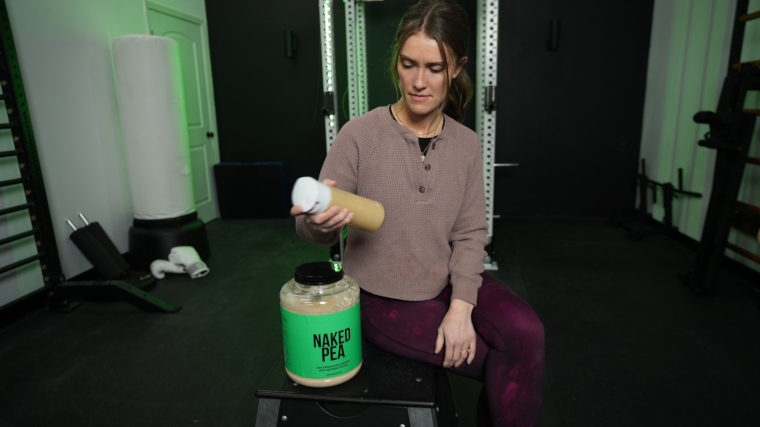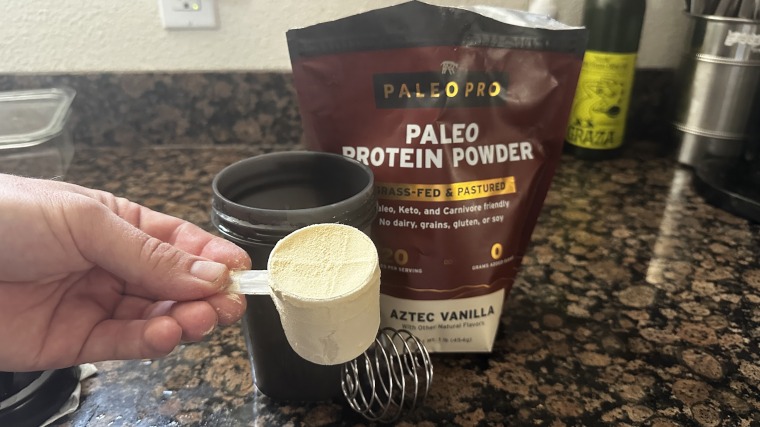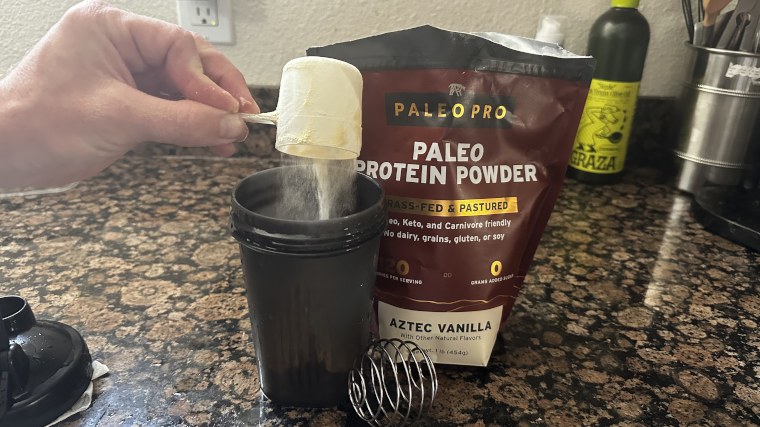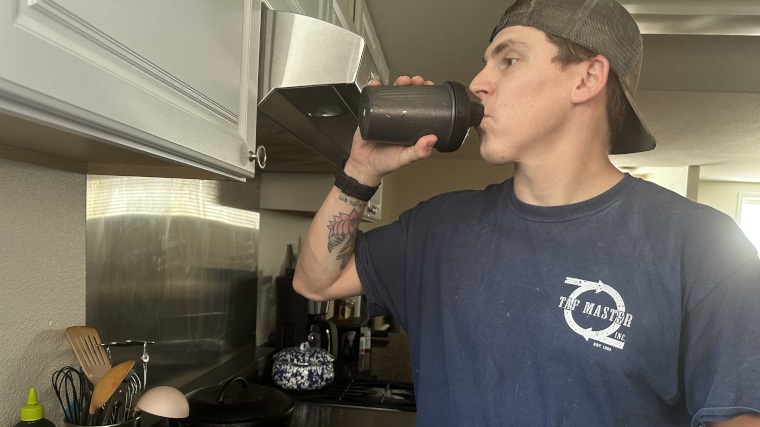Full stop: Paleo protein powder may or may not exist depending on your definition of paleo. Indeed, “whether or not protein powder can be considered paleo sort of depends on how much of a ‘purist’ you are to the definition of the diet,” says registered dietitian Angel Luk. But, hey, you came here because you’re searching for something that fits your paleo needs — and we’re here to provide (and we’ll give you all the nuances along the way).
So, hear us out: We like a looser definition of paleo — one that refers to eating mostly foods that are free from artificial ingredients. In that sense, many of the best protein powders can qualify as paleo. If you’re open to bending some of the technicalities, read on for the best paleo protein powders, selected from the 100+ protein powders for which our team of experts has done hands-on testing and dietitian analysis.
The 6 Best Paleo Protein Powders of 2026
- Best Paleo Protein Powder Overall: Transparent Labs Whey Protein Isolate
- Best Tasting Paleo Protein Powder: Gainful Protein Powder
- Best Paleo Protein Powder for Weight Loss: Sports Research Whey Protein Powder
- Best Budget Paleo Protein Powder: Nutricost Organic Rice Protein Powder
- Best Vegan Paleo Protein Powder: Naked Nutrition Pea Protein
- Best Grass-Fed Paleo Protein Powder: Paleo Pro Protein Powder
Medical disclaimer: The content on BarBend is meant to be informative in nature, but it should not be taken as medical advice. The opinions and articles on this site are not intended for use as diagnosis, prevention, and/or treatment of health problems. It’s always a good idea to talk to your doctor before beginning a new fitness, nutritional, and/or supplement routine. Individual needs for vitamins and minerals will vary.
Best Paleo Protein Powder Overall: Transparent Labs Whey Protein Isolate
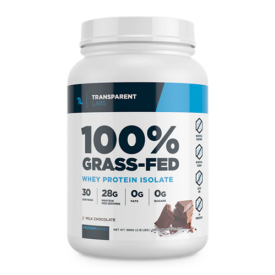
Transparent Labs Whey Protein Isolate is a high-quality powder with 28 grams of protein per serving, providing essential amino acids and BCAAs to support muscle growth. It’s Informed Choice certified, reassuring competitive athletes and other consumers that it’s free from banned substances and safe for consumption.
Specs
- Protein Per Serving: 28g
- Flavors: Chocolate Peanut Butter, Vanilla Peanut Butter, French Vanilla, Milk Chocolate, Oatmeal Chocolate Chip
- Main Ingredients: Whey protein isolate, Himalayan rock salt, stevia extract
- Third-Party Testing: Yes
- Protein Source: Grass-fed whey isolate
- Price Per Serving: $2
Transparent Labs Whey Protein Isolate may not fit everyone’s pickiest definition of paleo, but in the eyes of our product testers and a registered dietitian who reviewed the formula, it’s one of the best clean protein powders available, making it an excellent option for paleo eaters. It contains minimal ingredients and uses a natural sweetener and natural flavor agents for taste.
With 28 grams of protein per serving and just 3 grams of carbs and 2.5 grams of fat, the macro balance leans heavily toward protein, which is exactly what we want to see in a protein powder.
Chelsea Rae Bourgeois, LD, RDN, awarded the formula 4.5 out of 5 points because it “packs in the protein without any unnecessary fluff” and is free from artificial sweeteners, preservatives, food dyes, and other artificial ingredients. She docks it half a point because of the high sodium content, which nears 20% of the daily recommended intake.
Transparent Labs Whey Protein Isolate scores highly in both taste and texture from our team of expert testers, earning 5 out of 5 points for both categories. “I tried Peppermint Hot Chocolate, and it is divine,” our product tester says. “Literally what it says on the flavor label — just add marshmallows and whipped cream to complete the ambiance. No problems at all with solubility.”
Another tester recommends using milk over water for the best taste and texture, though people who are lactose-intolerant and those wanting to stick closer to the paleo definition may want to pass on that. Sweetened with stevia, some individuals may notice a slight aftertaste, but our testers didn’t detect any.
Best Tasting Paleo Protein Powder: Gainful Protein Powder
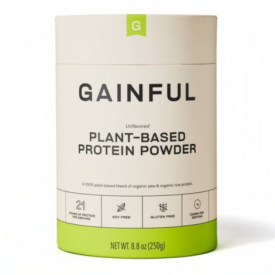
Gainful Plant-Based Protein Powder offers up to 24 grams of organic brown rice and pea protein, which delivers a complete amino acid profile. Right now, take 50% off your first order with the code: BF50.
Specs
- Protein Per Serving: 19–26g
- Flavors: Sea Salt Caramel, Cinnamon Toast, Madagascar Vanilla, Rich Cocoa, Chocolate Peanut Butter, Strawberry Cream, Caffe Mocha, Cookies & Cream
- Main Ingredients: Organic brown rice protein, organic pea protein
- Third-Party Testing: No
- Protein Source: Brown rice and pea protein
- Price Per Serving: $3
One of the best-tasting protein powders our product testing team has gotten their hands on (and we’ve tried more than 100), Gainful Plant Protein deserves a permanent spot in the paleo-conscious, plant-based athlete’s pantry.
Certified nutrition coach and BarBend editorial team member Alex Polish used Gainful Plant Protein for a couple of weeks, which means with the 15-serving bag they’ve almost finished their order. (“Right off the bat, I don’t love that there are so few servings per bag,” they say. Minor complaint, but still.)
Packaging aside, this protein powder scores highly in nearly every category. It earned 4.5 out of 5 points for taste, with Polish saying, “I chose Chocolate Peanut Butter and Cafe Mocha, both of which are delightful. The Mocha flavor doesn’t quite give me the coffee-esque vibe that I want, but it’s still very pleasant. It’s even strong enough to completely mask some pretty grassy greens powder when I tossed all of the above into a blender with a banana and some oat milk.”
It scores less highly, but still respectably, in the texture category. “In the blender, this comes out smooth and delightful. In a shaker cup, it’s pretty sticky on the sides, but then again it doesn’t take the most shaking in the world to get it into a nice solution. A 3.5 out of 5 from me,” Polish says.
[Related: Best Vegan Protein Powders]
With 19 to 26 grams of protein per serving, plus a minimal ingredients list, registered dietitian Chelsea Rae Bourgeois awards Gainful Plant Protein a score of 4.5 out of 5 points. She specifically points out that all blends are free from artificial ingredients (hello, paleo-ish dieters). Plus, having access to a registered dietitian immediately ups the value — and makes the $3-per-serving price point worthwhile.
While your exact protein blend will vary based on how you respond to the online quiz — which is a necessary prerequisite to ordering Gainful protein, as is a subscription — the main ingredients remain organic brown rice and pea protein which, together, form a complete protein with all nine essential amino acids to support muscle recovery and growth.
Read our full Gainful Protein Powder Review.
Best Paleo Protein Powder for Weight Loss: Sports Research Whey Protein Powder
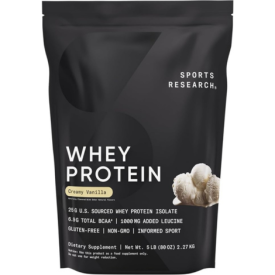
Offering 25 grams pf whey protein isolate alongside nearly 7 grams of BCAAs, Sports Research Whey Protein Isolate is a great option for those looking to supplement their diets, build muscle, and enhance workout recovery.
Specs
- Protein Per Serving: 25g
- Flavors: Chocolate, Creamy Vanilla
- Main Ingredients: Whey protein isolate, natural flavors
- Third-Party Testing: Yes
- Protein Source: Whey protein isolate
- Price Per Serving: $1.46
This affordable, low-carb protein powder is a winner for artificial-ingredient-hesitant folks who are also looking to lose weight, or simply support wellness and fitness goals. With 25 grams of protein and nearly 7 grams of BCAAs per serving — but just 140 calories and no artificial ingredients — it’s a prime protein option for almost anyone, truthfully.
Registered dietitian Chelsea Rae Bourgeois scores the formula with a very respectable 4.5 out of 5 points, saying: “It packs in the protein, including a hefty dose of BCAAs to support muscle recovery and growth. It contains 25 grams of protein per serving, including 6.9 grams of BCAAs, but minimal carbs and fat. If you’re looking to increase your protein intake without skewing your other macros, this could be a great option.”
Our product testers loves it, too, awarding it 5 out of 5 points for taste and the same for solubility. “Definitely got the Vanilla flavor right with this protein and it does have a creamier aspect to it, whether it was taken in water or milk,” one of our product testers says. “The only real taste you get is vanilla, nothing extra. It mixed great in the shaker cup; it was as if it was premixed, so definitely very soluble.”
This whey protein (specifically the Vanilla flavor) is a good choice for those seeking a paleo-friendly protein powder because it’s free from artificial sweeteners, gluten, soy, dyes, and other common additives. It does contain stevia and sunflower lecithin (for texture), so it’s not for paleo purists, but it’s darn close to being all-natural as far as protein powder is concerned.
[Related: Best Whey Protein Isolate]
Best Budget Paleo Protein Powder: Nutricost Organic Rice Protein Powder
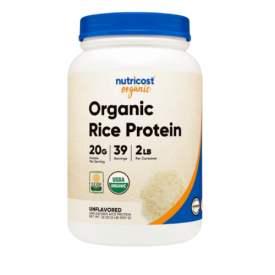
Nutricost's rice protein is completely organic and doesn't contain animal products, making this a vegan-friendly pick. It's also available in bulk.
Specs
- Protein Per Serving: 20g
- Flavors: Unflavored
- Main Ingredients: Organic rice protein
- Third-Party Testing: No
- Protein Source: Rice protein
- Price Per Serving: $1.33
No, our paleolithic ancestors didn’t eat rice (maybe wild rice…), but that doesn’t mean this Nutricost Organic Rice Protein Concentrate isn’t worth a gander. In fact, one could argue that this protein powder is among the most paleo-friendly. It’s soy-free, gluten-free, dairy-free and — you guessed it — devoid of any artificial ingredients.
The label reads just one thing: organic rice protein. If that’s not “clean,” we don’t know what is! Additionally, this protein powder is both USDA Certified Organic and CCOF Certified Organic.
And it tastes pretty decent, too. According to certified nutrition coach, personal trainer, and BarBend editorial team member Alex Polish, this one gets a 3.5 out of 5 for taste. “Do I recommend having this on its own, say, with water? Nope. But in oat milk, or even with water in a blender with a banana and your fruit of choice (raspberries are mine), this tastes delightful. It doesn’t interfere with my smoothie desires at all.”
The texture is a bit more complicated, Polish explains. “The scoop for a serving on this is kind of comically large: it’s a whole quarter cup! That makes for a very thick protein shake, even if you load it up with liquid and use a blender (which I definitely recommend). Now, I love that personally, but when I passed this to my partner, they shook their head and handed it right back, saying it was too thick. So, for their sake — and yours, if you’re not a fan of this-almost-needs-a-spoon smoothies — I give this one a 2.5 out of 5 for solubility. It’s down the middle because you might love it, you might hate it. It’s definitely a personal thing.”
Despite its single-ingredient glory, I have to rate the formula of Nutricost Rice Protein Concentrate with 4 out of 5 points, docking that one because, on its own, rice is not a complete protein. It’s deficient in lysine, a key essential amino acid involved in many physiological processes. (1) If you decide to go with rice protein, consider pairing it with another plant-based protein source, such as pea, pumpkin, chia, or quinoa protein.
Best Vegan Paleo Protein Powder: Naked Nutrition Pea Protein
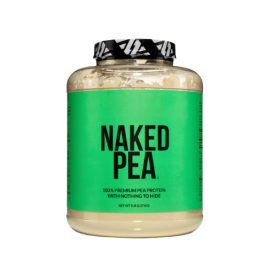
On the search for vegan protein powders, Naked Nutrition Pea Protein has what you need. With 18 grams of pea protein per serving, this powder has a much higher protein level per serving than many other vegan versions out there.
Specs
- Protein Per Serving: 27g
- Flavors: Unflavored, Vanilla, Chocolate, Chocolate Peanut Butter, Double Chocolate
- Main Ingredients: Pea protein
- Third-Party Testing: No
- Protein Source: Pea protein
- Price Per Serving: $0.96
Affordable and all-natural, Naked Nutrition Pea Protein should be high on the shopping list for those seeking a paleo-friendly protein powder (or anyone looking for the best pea protein powders). The unflavored version of this protein powder contains just one ingredient: organic pea protein. The flavored versions boast minimal ingredients lists, too, with natural flavor agents like cocoa powder and salt added.
You won’t find any artificial sweeteners, flavors, dyes, preservatives, emulsifiers, or otherwise unnatural ingredients in this protein powder. It does, however, contain added sugars in the form of raw coconut sugar. Paleo? Technically, no, but our paleolithic ancestors weren’t eating protein powder, anyhow.
Because Naked Nutrition Pea Protein provides an impressive 27 grams of protein per serving (very high for a plant-based powder) and is free from artificial ingredients, the formula earned 4 out of 5 points from me. However, because pea protein lacks sufficient methionine, it’s best to pair this protein powder with a complementary source for a complete amino acid profile. (2)
Unfortunately, this protein powder doesn’t score quite as highly in the taste arena. Our expert tester, a certified nutrition coach, says, “You’ll admittedly get a strong pea protein taste with this one, probably because the serving size is a very hefty two scoops. If you’re not used to the taste, you’ll probably want to start with half a serving. It’ll probably overpower whatever you’re mixing it with, so just know that you’re in for an earthy experience.” The score? 2.5 out of 5 points.
Thankfully, it blends a lot better than it tastes. Our tester explains: “It blends fine, especially considering how large each serving is. I made protein oatmeal with it and found it to be super creamy and rich.” The pea protein earns 4 out of 5 points in this category.
[Read More: Pea Protein Benefits]
Best Grass-Fed Paleo Protein Powder: Paleo Pro Protein Powder
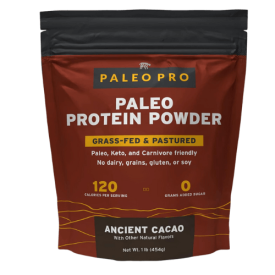
This paleo-friendly protein powder packs 26 grams of protein per serving and comes in three different flavors. It's also available in bulk buy options.
Specs
- Protein Per Serving: 26g
- Flavors: Aztec Vanilla, Ancient Cacao, Mayan Mocha, Mocha Mint, Plain Naked (unflavored)
- Main Ingredients: beef protein isolate, egg white protein, natural flavors
- Third-Party Testing: No
- Protein Source: Beef protein isolate, bovine collagen, egg white protein
- Price Per Serving: $2.86
You may have heard of whey isolate, but have you heard of beef isolate? No, these two types of protein powder are not one and the same. Whey protein is a cheese-making byproduct; it comes from milk. Beef protein comes from (drumroll) beef. It’s made by boiling, skimming, drying, hydrolyzing, filtering, and again drying beef. It’s an extensive process, but the result is a protein powder that’s ultra-rich in amino acids and completely free from lactose. (3)
In addition to beef protein isolate, Paleo Pro Protein Powder also contains bovine collagen and egg white protein from eggs laid by pasture-raised hens. The formula earns 4.5 out of 5 stars from me. I like that it offers 26 grams of protein per serving and is free from gluten, dairy, lactose, soy, and preservatives; however, it’s somewhat high in sodium (10% DV) and still contains some ingredients that paleo people might prefer to avoid: sunflower lecithin and monk fruit extract for sweetness.
You might wonder how such a beefy protein source can actually taste good, and I’d say that’s a valid concern. But according to our expert tester, this protein powder is among the best-tasting they’ve tried. “The Ancient Cacao flavor is a definite standout from any of the other chocolate-y protein powders I’ve had before (and there have been a lot!),” they say. “I like it a lot, especially because it doesn’t lean on artificial sweeteners to give it a flavor boost. It gets a 4.8 out of 5 for flavor from me.”
They felt similarly about the solubility, awarding it 5 out of 5 points. “Especially compared to other protein powders, this mixed like a dream and was extremely smooth to drink,” they say. “I tend to blend it with cold water, and it’s lovely, including in the digestion department.”
How We Tested and Chose the Best Paleo Protein Powder
The BarBend team consists of certified personal trainers, certified nutrition coaches, and athletes, as well as a roster of licensed and credentialed experts in nutrition and fitness. In addition to being pros in the fields we cover, we take a hands-on approach to product testing. Our product testing team has tested well over 100 different protein powders and rated them according to our multi-point supplement methodology, where we rate the categories that matter to you on a scale of 1 (uh-oh) to 5 (fab). We’ve also had a registered dietitian or certified sports nutrition coach review and analyze the formulas. For this guide, here’s what we prioritized to determine the shortlist.
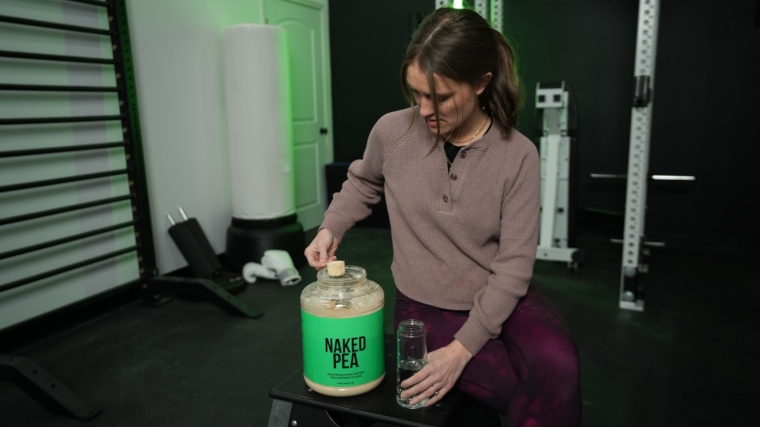
- Formula and Ingredients: Being that this is a guide to paleo protein powder, the first and foremost priority was the ingredients list. We looked for protein powders with minimal added ingredients, including added sugars, and no artificial ingredients, like artificial sweeteners, dyes, and preservatives.
- Macro Balance: Regardless of ingredients, a protein powder should still be high-protein. We looked for formulas with a protein-heavy macro ratio and minimal carbs and fats.
- Taste and Texture: Paleo protein powders are more subject to funky tastes and textures because they’re free from all of the ingredients that make things palatable: artificial sweeteners, emulsifiers, and anti-caking agents, to name a few. We placed a heavy emphasis on powders that dissolved well in our testing and left us craving more.
- Third-Party Testing: If you’re concerned with the paleo diet, I think it’s safe to assume you’re concerned with what’s in your food (valid). As such, this guide prioritizes protein picks with transparency factors, like third-party testing, lab results, and transparent labels.
- Protein Source: Though protein powder itself isn’t technically paleo by definition, there are certain things that make it more paleo-adjacent. One of those things is the actual source of the protein, such as grass-fed versus conventional beef and non-GMO and/or organic plant sources.
Benefits of the Best Paleo Protein Powders
First things first: let’s define “paleo” here. The Paleolithic Era spans between roughly 2.5 million to 10,000 years ago, during which time the human population ate foods they could hunt and gather, registered dietitian Angel Luk explains. These foods included plants including nuts, seeds, fruits and vegetables, animal foods like meats, fish and eggs. It did not, however, include grains, legumes, and dairy.
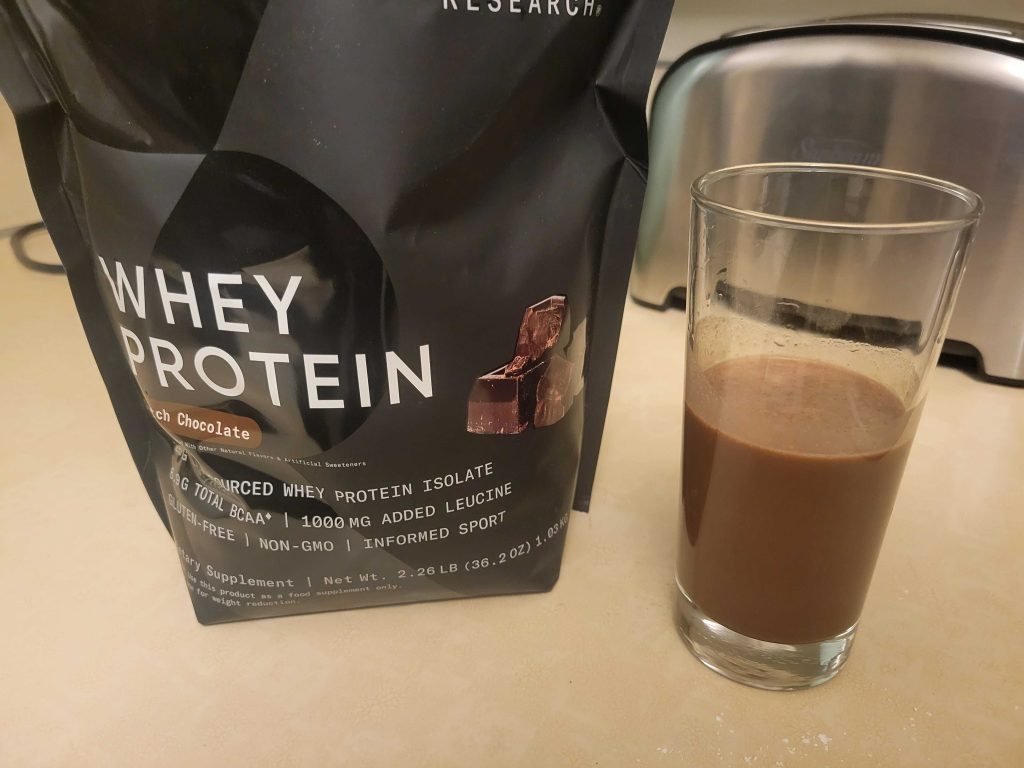
“So technically, whether or not a protein powder can be considered paleo depends on what the protein source is and whether the protein source is derived from modern farming techniques that only started about 10,000 years ago,” she says. That makes egg white protein and hemp protein contenders for the paleo designation, while whey, casein, rice, pea, and other sources are not. (I mean, if you want to get really technical, no neanderthals were eating any type of protein powder…)
The best protein paleo powders come with all of the same benefits as the best non-paleo protein powders, with the added benefit of being free from (most) artificial ingredients.
- Muscle Growth: Increasing your protein intake, whether from protein powder or whole foods, can help you build muscle mass. Complete proteins provide essential amino acids, which are necessary for muscle protein synthesis. (4)
- Muscle Recovery: Protein powder may also help your muscles recuperate post-workout. Studies have shown that consuming protein powder post-workout reduces biomarkers of muscle damage. (5)
- Satiety: Like all types of protein, paleo protein can help you feel more full throughout the day. Studies show that high-protein diets can reduce cravings and increase satiety, which may help with weight loss efforts. (6)
- Fewer Side Effects and Lower Allergen Risk: “Choosing a more paleo-friendly protein powder can have benefits especially for those who are looking for a cleaner ingredient list,” says registered dietitian Brittany Werner. “The minimal ingredient list is helpful for those with digestive issues as these products will not include gluten, dairy, or soy. There is also a lower allergen risk in a minimally processed supplement such as a paleo-friendly protein shake.”
How Much Do The Best Paleo Protein Powders Cost?
The cost of protein supplements varies substantially depending on the source of protein, manufacturing practices, third-party testing, and other factors. Grass-fed beef protein and bone broth protein powders, for instance, tend to cost significantly more than plant-based protein powders (though there are some exceptions to the rule). If you choose to make your protein shake from one of the items in this guide, you can expect to pay anywhere from about $1 per serving to $3 per serving.
| Best Paleo Protein Powder Overall | Transparent Labs Whey Protein Isolate | $2 per serving |
| Best Tasting Paleo Protein Powder | Gainful Protein Powder | $3 per serving |
| Best Paleo Protein Powder for Weight Loss | Sports Research Whey Protein Powder | $1.46 |
| Best Budget Paleo Protein Powder | Nutricost Organic Rice Protein Powder | $1.33 |
| Best Vegan Paleo Protein Powder | Naked Nutrition Pea Protein | $0.96 |
| Best Grass-Fed Paleo Protein Powder | Paleo Pro Protein Powder | $2.86 |
What to Consider Before Buying the Best Paleo Protein Powder
The three top things to look for in a protein powder are a minimal ingredients list, the protein content, and transparency in manufacturing.
Ingredients
For those on a paleo or paleo-ish diet, additives are of the utmost concern. “Protein powders marketed as paleo will focus on whole, unprocessed ingredients,” says registered dietitian Brittany Werner, director of coaching at Working Against Gravity. “Typically, these supplements contain egg white protein, collagen, or pea protein and will be free of dairy products, refined sugars, and gluten.”
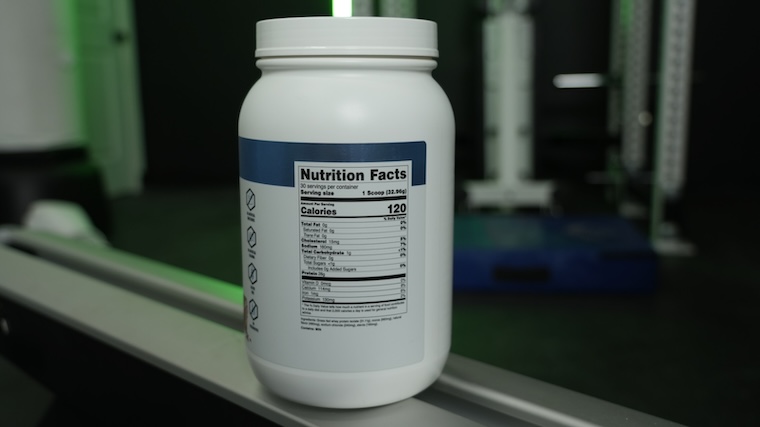
A paleo-friendly protein powder has a minimal formula and is also free from common protein powder additives, such as soy or sunflower lecithin, artificial sweeteners, artificial dyes/colors, artificial flavors, and preservatives. While some of the best clean protein powders do contain additives, it’s ideal to keep them minimal when on a paleo-like diet.
Protein Content
In Canada and the U.S., the ingredients in any food product are listed by weight, in descending order. Registered dietitian Angel Luk says to check the ingredients list to make sure that the protein source of the protein supplement you’re buying is the first ingredient listed, to ensure you’re paying for the most protein for your buck. Ideally, a protein powder will have at least 20 grams of protein per serving, with some of the best options offering up to 30. (If you’re looking for one of the best meal replacement shakes, look for up to 40 grams of protein with ample carbs and fats, too, along with vitamins and minerals.)
Third-Party Testing and Transparency
Third-party or independent lab testing is the number one way to ensure a product label is accurate. Supplements are highly unregulated, so it’s next to impossible to know if a label is accurate without some form of testing.
Look for these indicators that a product is tested: NSF Informed Sport, NSF Informed Choice, NSF Informed Protein, Labdoor Certified, and ConsumerLab certified. If a product lacks a third-party testing emblem, check for other indicators, such as certificates of analysis (CoAs) or certificates of composition (CoCs).
Best Paleo Protein Powder FAQs
Is protein powder OK on paleo?
It depends on how attached you are to the true definition of paleo. “Protein powder is by definition not a paleo food,” says registered dietitian Brittany Werner, director of coaching at Working Against Gravity. “The paleo diet focuses on eating foods that were available to our ancestors during the Paleolithic era: these foods include meat, fish, vegetables, nuts, and seeds.”
What makes a protein powder paleo?
According to registered dietitian Angel Luk, what makes a protein powder paleo is whether the protein source is derived from modern farming techniques that only started about 10,000 years ago. That means hemp and egg white protein powder are the only truly paleo protein powders. (And even then, egg white is a stretch, because modern protein powders use chicken eggs, whereas paleolithic people ate eggs from wild birds). Even beef protein powder, collagen peptides, and similar products are not technically paleo. But, again, it all depends on your definition and what you’re OK with.
Is pea protein OK for a paleo diet?
According to the true definition of “paleo,” no, pea protein is not an acceptable product to eat on a paleo diet. That said, a looser definition of paleo (that is, “paleo-ish”) refers to eating mostly whole foods and avoiding foods with artificial ingredients, in which case pea protein powder could fit the bill.
What is the best paleo protein powder?
Our top pick for the best protein powder on a paleo diet is Transparent Labs Whey Protein Isolate. Though the protein source is technically not paleo by the strictest of definitions (no protein powder is!), our testers and dietitian like that it uses natural sweeteners and flavor agents, and includes minimal ingredients while providing nearly 30 grams of protein per serving.
References
- Wong HW, Liu Q, Sun SS. Biofortification of rice with lysine using endogenous histones. Plant Mol Biol. 2015;87(3):235-248. doi:10.1007/s11103-014-0272-z. https://www.ncbi.nlm.nih.gov/pmc/articles/PMC4302240/
- Babault, N., Païzis, C., Deley, G. et al. Pea proteins oral supplementation promotes muscle thickness gains during resistance training: a double-blind, randomized, Placebo-controlled clinical trial vs. Whey protein. J Int Soc Sports Nutr 12, 3 (2015). https://doi.org/10.1186/s12970-014-0064-5
- Sharp M, Shields K, Lowery R, et al. The effects of beef protein isolate and whey protein isolate supplementation on lean mass and strength in resistance trained individuals – a double blind, placebo controlled study. J Int Soc Sports Nutr. 2015;12(Suppl 1):P11. Published 2015 Sep 21. doi:10.1186/1550-2783-12-S1-P11. https://www.ncbi.nlm.nih.gov/pmc/articles/PMC4595383/
- Carbone JW, Pasiakos SM. Dietary Protein and Muscle Mass: Translating Science to Application and Health Benefit. Nutrients. 2019;11(5):1136. Published 2019 May 22. doi:10.3390/nu11051136. https://www.ncbi.nlm.nih.gov/pmc/articles/PMC6566799/
- Deldicque L. Protein Intake and Exercise-Induced Skeletal Muscle Hypertrophy: An Update. Nutrients. 2020;12(7):2023. Published 2020 Jul 7. doi:10.3390/nu12072023. https://www.ncbi.nlm.nih.gov/pmc/articles/PMC7400877/
- Moon J, Koh G. Clinical Evidence and Mechanisms of High-Protein Diet-Induced Weight Loss. J Obes Metab Syndr. 2020;29(3):166-173. doi:10.7570/jomes20028. https://www.ncbi.nlm.nih.gov/pmc/articles/PMC7539343/
